7 Christian Olympians Who Left a Legacy of Faith

God uses people on a variety of platforms, enabling them to share their faith in unique and powerful ways. One of those platforms is with athletes, on the world stage at the Olympics.
Here are seven short stories about famous Christian Olympians.
Photo credit: ©Getty Images/Nora Carol Photography
1. Forrest Smithson: Pointing People to Jesus
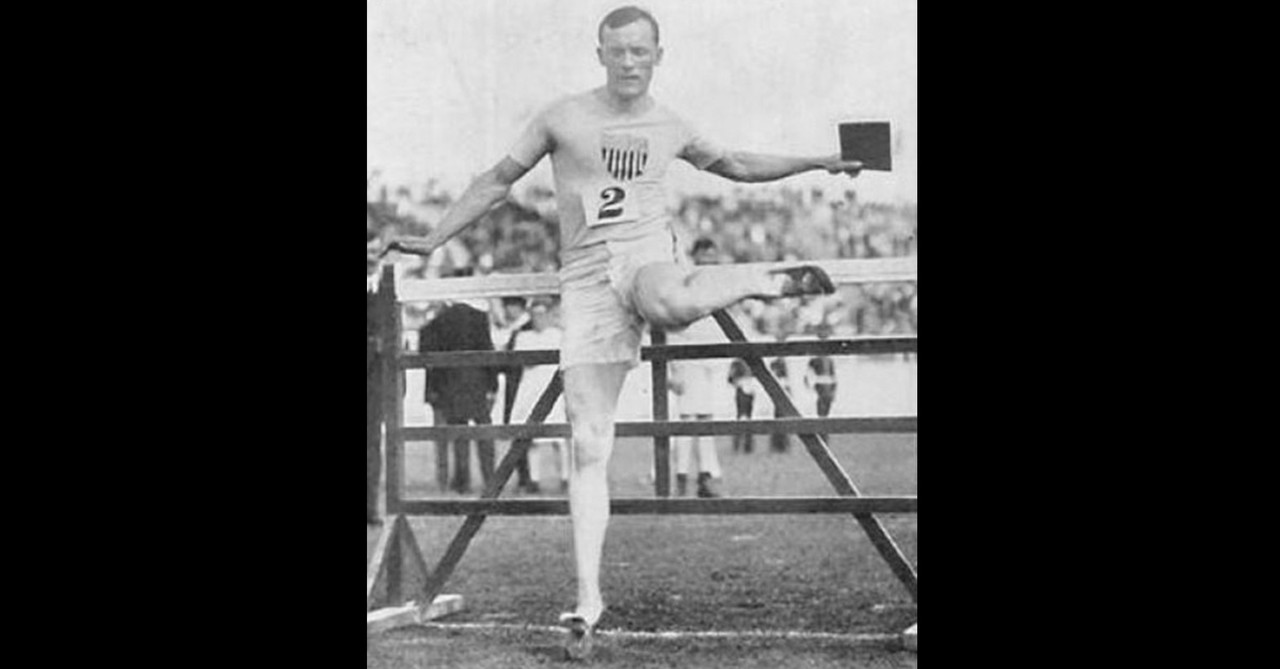
1. Forrest Smithson: Pointing People to Jesus
SLIDE 1 OF 7
1908 London Olympics
A hoax developed around this man of God who captured the hearts of Olympians with his fervent faith. Forrest Custer Smithson, an American, participated in the 1908 Summer Olympics in London, winning the 110-meter hurdles.
Smithson was a theology student from Yale University — later becoming a Baptist minister. When he attended the 1908 London Games, the 110-meter hurdles were on the final day of the Games. During the race, Smithson gained slightly against his competitors over each hurdle. He won by five yards, setting a new world record of 15 seconds.
A story circulated widely about Smithson winning his gold medal while carrying a Bible in his left hand — reportedly as a protest against the decision to run the final on a Sunday. The story was false. None of the hurdles were planned or scheduled for Sunday, and the photo posted of him with the Bible was posed after the race.
According to a genealogy site about Smithson, this photo clearly indicated he was a “highly religious man.” It’s said that he did often run with a Bible in his hand to point people to Jesus, the source of his strength. Smithson died in 1962.
Photo credit: Courtesy Wikimedia Commons
2. Eric Liddell: “Radiant Godliness”
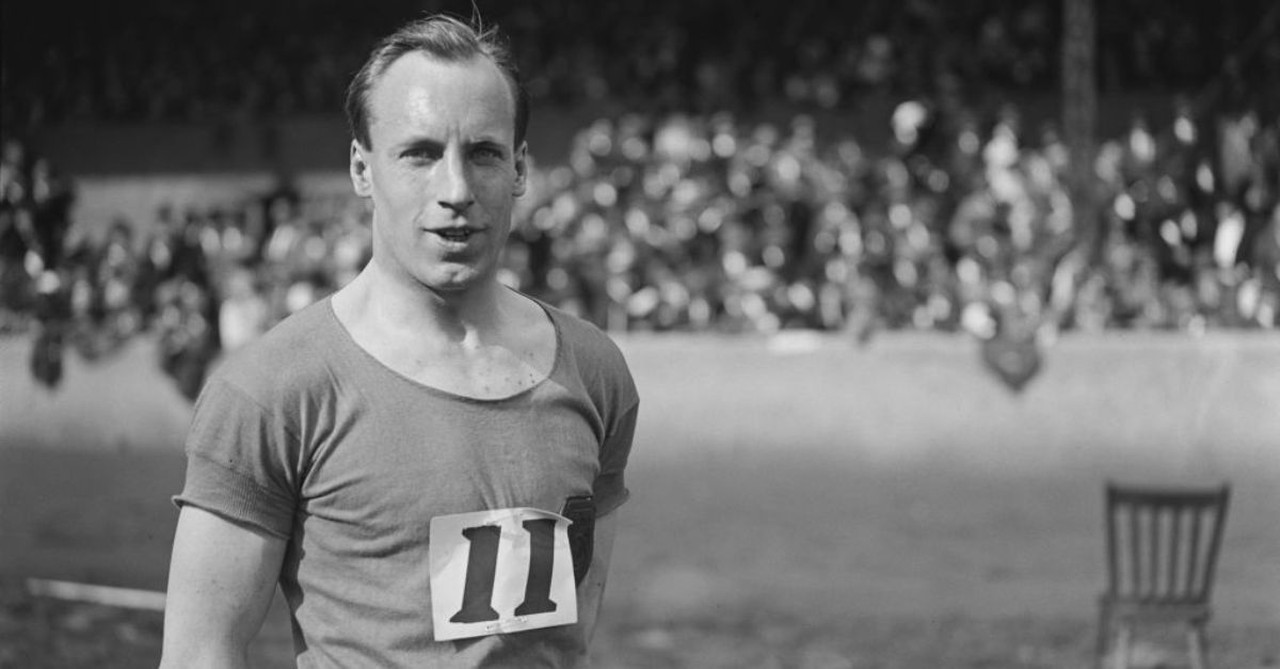
2. Eric Liddell: “Radiant Godliness”
SLIDE 2 OF 7
1924 Paris Olympics
Eric Henry Liddell is likely the most well-known Christian Olympian. He captured the imagination of the world with his character, courage, and conviction. Born to missionary parents and living in a missionary compound in Siaochang, China, Eric was sheltered from the hardships his parents and Chinese Christians faced in 1900. During The Boxer Rebellion, 200 missionaries and more than 30,000 Chinese Christians were killed.
Eric’s parents enrolled him in London’s School for the Sons of Missionaries (later named Eltham College) and then returned to the mission field. Besides academics and Christian character training, the school also had a strong sports emphasis. Completing high school during World War I, the students were encouraged to “play the game” of life in a way that honors the Lord.
It’s said that the more time Liddell gave to witnessing about his faith, the faster he seemed to run. At the British Olympic Trials in July of 1923, Liddell set a new, long-standing British record for the 100-yard race with 9.7 seconds. He won the 220-yard race at 21.6 seconds. One week later, in a quarter-mile race, he was knocked down at the beginning of the race and ended up 30 yards behind the other athletes — but dramatically, he came from behind to win! That astounding display of athletic courage won him a place in sports history, and the British Olympic Trials qualified him for the 1924 Paris Olympics.
His convictions were tested in Paris when the 100-meter qualifying round was scheduled for a Sunday. Liddell felt Sunday was the Lord’s day, and he never ran on Sundays. When he refused to run, Liddell was labeled a traitor to his country. But he held his ground, choosing to honor God and prioritize his spiritual race.
After that Sunday, Liddell ran in the 200-meter and 400-meter races. He won a bronze medal in the first, but it is the second race that is remembered. Placed in the worst lane and running against an American record-holder, Liddell nonetheless crossed the finish line in an incredible 47.6 seconds, winning Olympic gold. He returned to Scotland a hero, praised for his running, but more so, for his integrity.
Joel Woodruff at the C.S. Lewis Institute said of Liddell, “He may be the best historic mentor and Christian sports star of the past century” and described him as “a man whose humble life combined muscular Christianity with radiant godliness.”
In 1925, Liddell returned to China as a missionary. On his first furlough in 1932, he became an ordained minister. Following the Japanese invasion of China in 1937, Liddell’s evangelistic work became more dangerous, and in 1943 he and 2,000 others were sent to a Japanese internment camp. While there, Liddell taught math, science, Bible, and sports to the interned youth. After he died of a brain tumor in 1945, in prison, it was discovered that Winston Churchill had negotiated his release. But Liddell sent a pregnant woman home in his place.
Photo credit: ©Getty Images/A. R. Coster/Stringer
3. Jesse Owens: Running for an Imperishable Crown
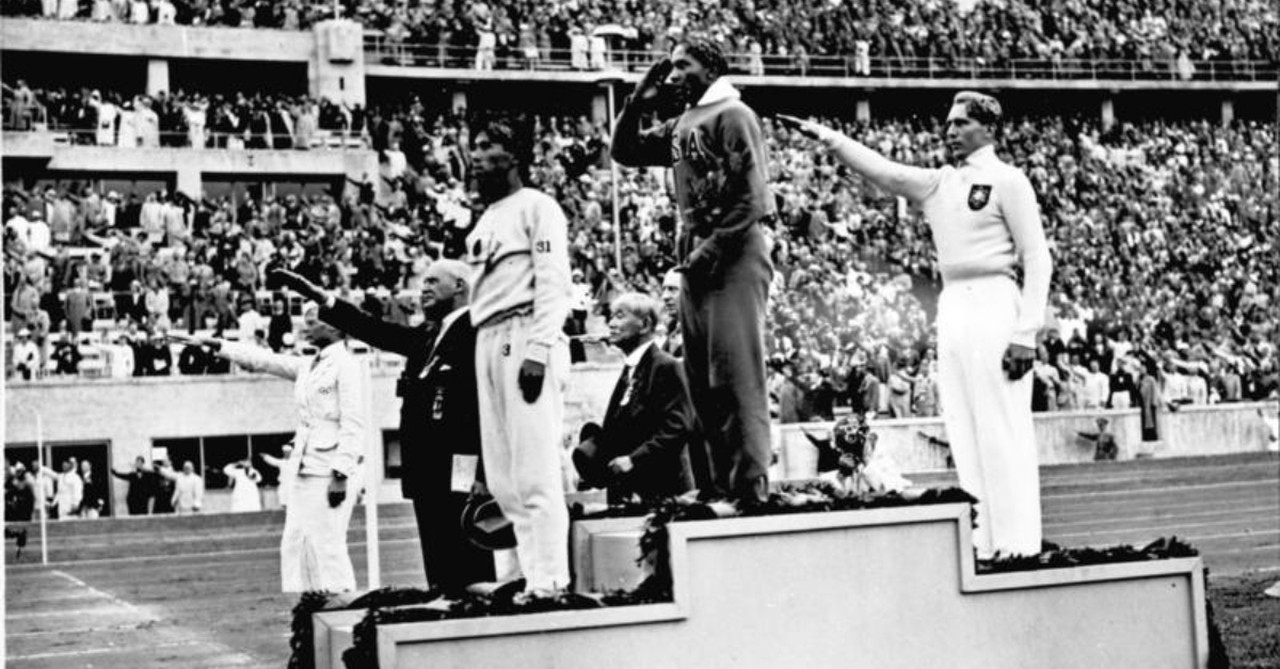
3. Jesse Owens: Running for an Imperishable Crown
SLIDE 3 OF 7
1936 Berlin Olympics
James Cleveland “Jesse” Owens’ story stands out in a time of tremendous turmoil and hate. At the Berlin Games in 1936, he won four gold medals in track and field in the 100-meter, 200-meter, 4x100 meter relay, and the long jump. Owens, a Black man, and Luz Long, a white German, defied Nazi racial tensions through their mutual faith and friendship.
When Owens entered the Olympics, it was amidst Hitler’s twisted scheme that the Games would support his belief that the “Aryan” people were the dominant race. When Owens made his final jump — in full view of Hitler — he discredited that master race theory. He proved that his striving for excellence distinguished him, not his national origin or race.
Owens was brought up in a devout Baptist home. After the Olympics, he received a letter from Luz Long. The German was serving in the military in World War II. Long mentioned his new-found faith in God, which he attributed to Owens’ influence. Dr. Kevin Jones, referencing his book about Owens, said, “We see that Jesse ran races for crowns that are perishable. . . But what we see in the time, energy, effort, and dedication he put into his sport is an image of the Christian walk and life. As Christians, we don’t run for a perishable crown but for an imperishable one.”
After the Olympics, Owens worked with young people in the poorest neighborhoods and became an inspirational speaker. He received the Medal of Freedom in 1976 and the Living Legend Award in 1979. Owens died from lung cancer in 1980.
Photo credit: Wikimedia Commons
4. Louis Zamperini: Forgiven and Forgiving
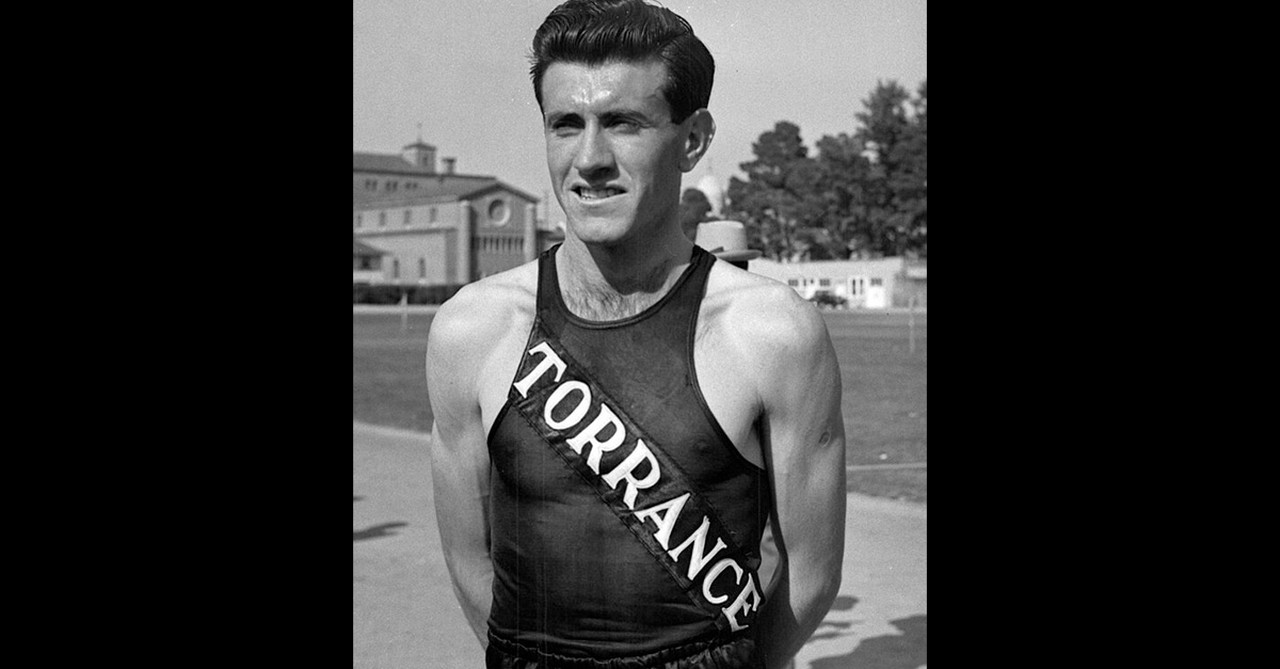
4. Louis Zamperini: Forgiven and Forgiving
SLIDE 4 OF 7
1936 Berlin Olympics
The book Unbroken tells the story of a drunk, bitter man, Louis Silvie Zamperini, whose life was transformed by God. Although he was not a believer at the Olympics, Zamperini later — as a believer — participated in the torch relay for the 1998 Olympic winter Games in Japan. Today, he is remembered as a man of valor and victory in Jesus, his Savior.
Zamperini qualified for the Summer Olympics in Berlin in 1936 — the youngest American to qualify (at age 19) for the 5,000-meter race. Although he didn’t win a medal, he did set a new final lap record. Adolph Hitler called him to the grandstand and said, “Ah, you’re the boy with the fast finish.”
After the Olympics, Zamperini was commissioned in the U.S. Army Air Forces and served as a bombardier during World War II. After his plane crashed and he was left adrift on a life raft for 47 days with two crewmates, he landed on the then-Japanese Marshall Islands. Captured by the Japanese Navy, he was sent to four different POW camps. Zamperini was continually tortured and beaten, especially by a prison guard named Mutsuhiro “The Bird” Watanabe, who mocked his Olympic participation. Zamperini was finally released at the end of the war.
Bitterly angry, Zamperini struggled with PTSD and became an alcoholic. He had nightmares about strangling his former captors. Though raised in a devout Catholic household, it was not until Zamperini and his wife attended a Billy Graham evangelistic crusade in 1949 and he became a born-again Christian and found the peace and freedom he so desperately sought. He eventually even forgave his captors.
Later, Graham helped Zamperini become a Christian evangelist. Zamperini’s emphasis was on forgiveness in Christ. He sent Watanabe a letter, forgiving his tormentor. Zamperini bore the torch of faith until he died of pneumonia in 2014.
Photo credit: Wikimedia Commons/Los Angeles Times
5. Jack Robinson: A Founder of the Fellowship of Christian Athletes
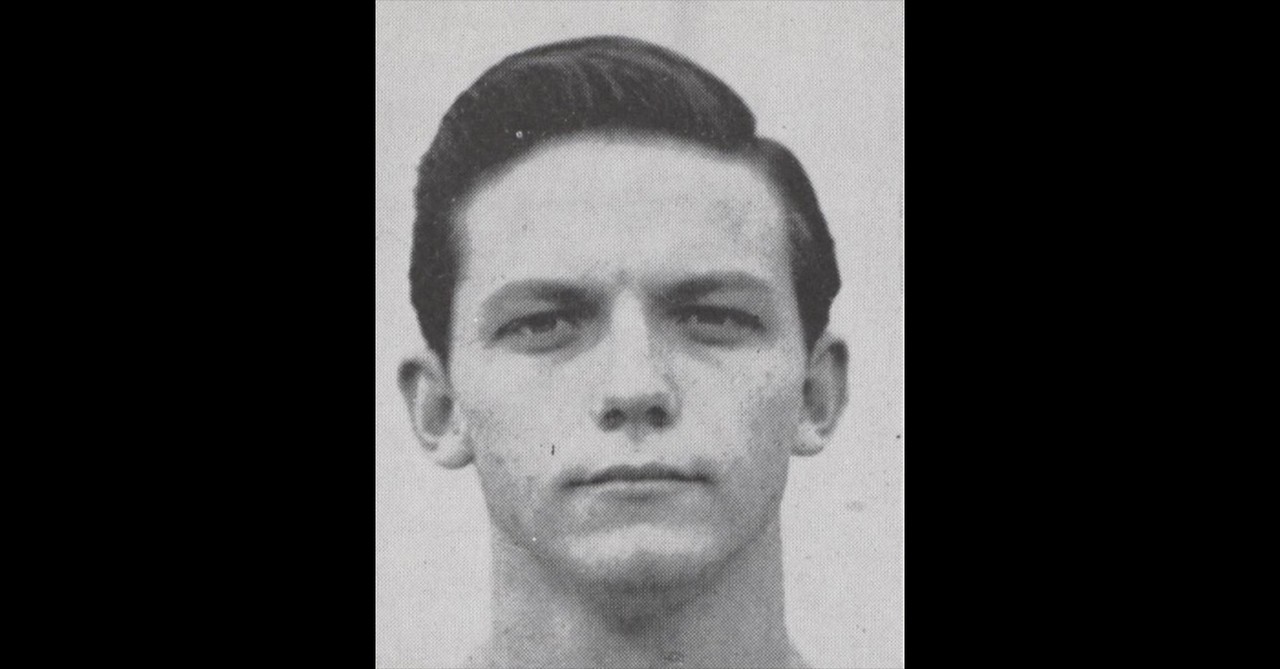
5. Jack Robinson: A Founder of the Fellowship of Christian Athletes
SLIDE 5 OF 7
1948 London Olympics
In the wake of World War II, a basketball player, Jack “Jackie” Roosevelt Robinson — no relation to the groundbreaking Brooklyn Dodger — was selected to represent the United States at the 1948 London Olympics. Robinson was a graduate of Baylor University in Texas, and a two-time All-American for the Baylor Bears. Further education included a doctorate in theology at the University of Edinburgh in Scotland.
Robinson distinguished himself at the Olympics as a guard, helping his team win a gold medal. But for Robinson, competing was simply an opportunity to share and grow his faith. He reflected, “In the face of what people around the world are up against, I was made to wonder how my religion would react. I found my Christ adequate again.”
Returning to Baylor for his senior year, Robinson tore a tendon in his right knee. His sporting conquests were over. He became a minister, pastoring First Baptist Church in Augusta, Georgia (1953-74). He also served as a founding member of the Fellowship of Christian Athletes (FCA). Robinson died of a heart attack in Augusta in 2022.
Photo credit: Wikimedia Commons/Baylor University
6. Rafer Johnson: Identity in Jesus Christ
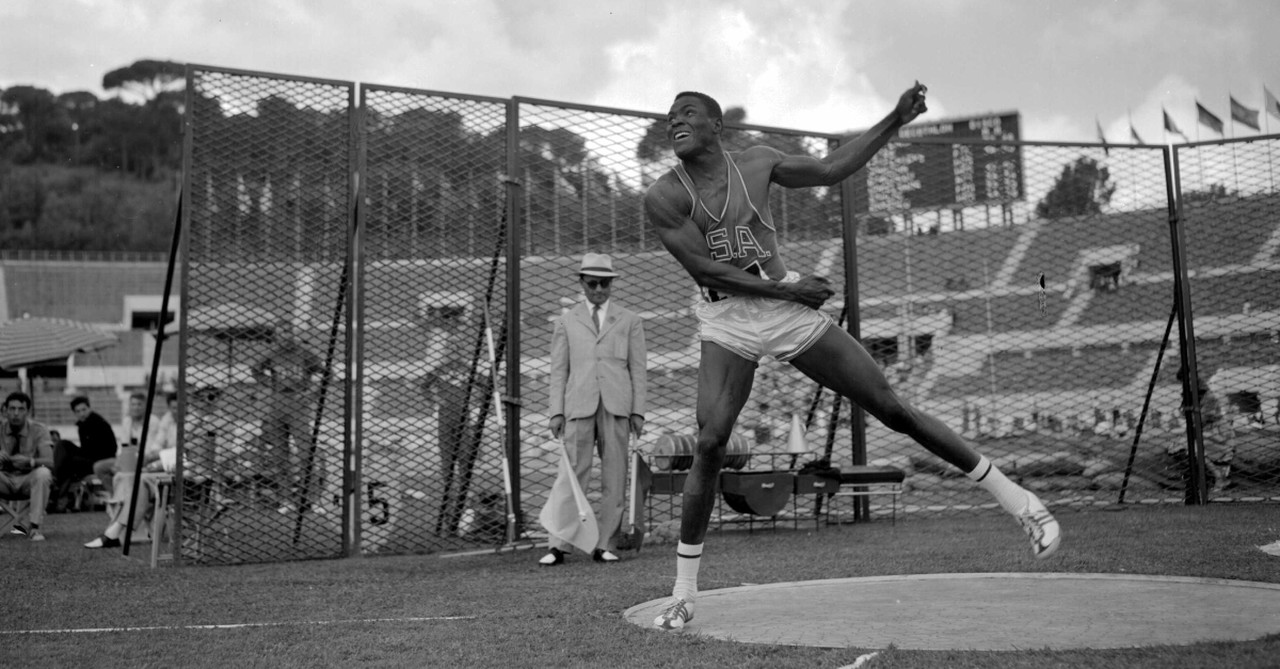
6. Rafer Johnson: Identity in Jesus Christ
SLIDE 6 OF 7
1956 Melbourne Olympics / 1960 Rome Olympics
Rafer Lewis Johnson played many sports, including basketball at UCLA under legendary coach John Wooden, but it was in track and field that he earned his fame.
In the 1956 Melbourne Olympics, Johnson won the silver medal in the decathlon. In 1960 in Rome, he won gold by 58 points, with an Olympic record total of 8,392 points. His accomplishments came in the midst of the civil rights movement, and he broke ground as the first Black American to carry the U.S. flag in the opening ceremony in Rome.
At UCLA, Johnson was a starter for the Bruins (1958-59). Then, in the 1959 NFL Draft, he was selected by the Los Angeles Rams as a running back.
Johnson’s ability to connect with individuals also brought him acclaim. He became an actor and sportscaster, and received many accolades. He was instrumental in creating the California Special Olympics. In 1984, he had the honor of lighting the Olympic flame before the Los Angeles Games.
It’s not only athletic achievements that are part of Johnson’s identity, but also his identity in Christ and his strong Christian faith. He became involved with two ministries: Campus Crusade for Christ (now Cru) and the Fellowship of Christian Athletes. Johnson died from a stroke in 2020.
Photo credit: ©Getty Images/Hulton Archive / Stringer
7. Madeline Mims: Meant to Glorify Jesus
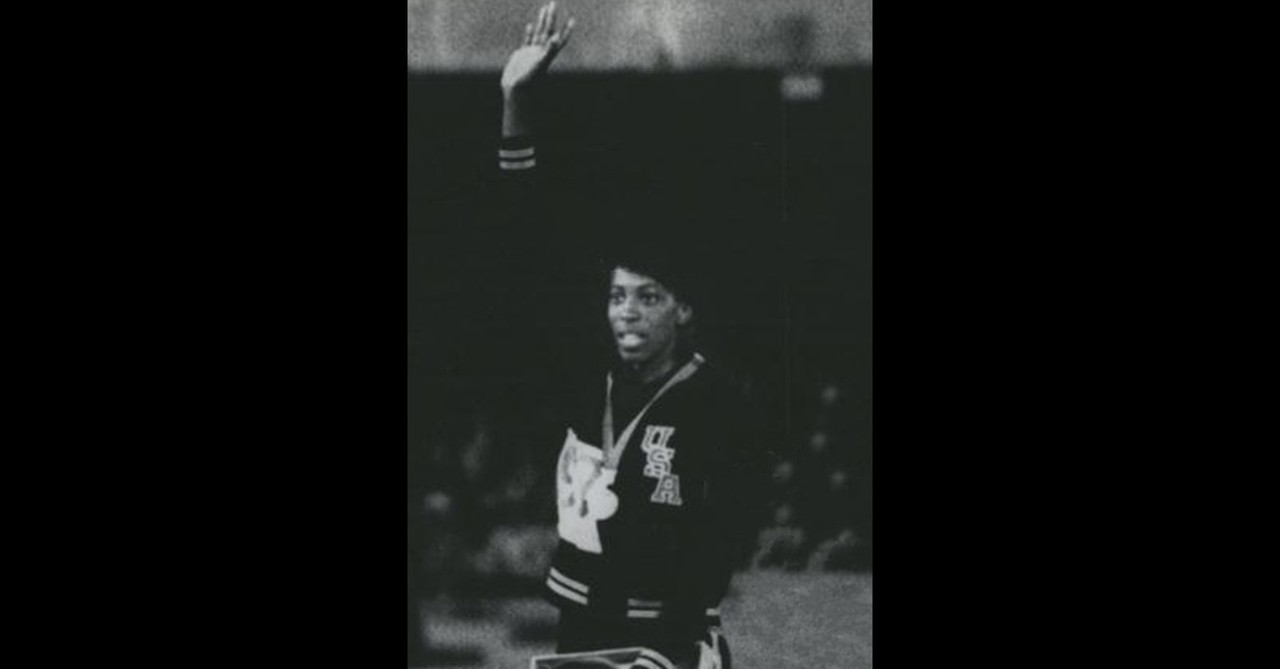
7. Madeline Mims: Meant to Glorify Jesus
SLIDE 7 OF 7
1968 Mexico City Olympics / 1972 Munich Olympics
Madeline Manning-Jackson Mims’ 16-year international track and field career included being a member of four U.S. Olympic Teams as well as several National Teams. Diagnosed with spinal meningitis at age three, she wasn’t expected to survive; but her illness helped to shape her life. She pushed beyond it to become a sports champion. Mims attributes her strength to a praying mother who — in the face of doctors’ dire predictions — gave Mims to the Lord, vowing to raise her in His ways.
At the 1968 Games in Mexico, Mims became the first American woman to win a gold medal in the 800 meters, setting an Olympic and world record that she held for fifteen years. In the 1972 Games in Germany, she won a silver medal as a member of the 4x400 meter relay team.
She won a gold medal at the 1967 Pan American Games in Canada — the first American woman to break two minutes in the 800 meters. She also made the U.S. Olympics team in 1976 in Montreal and in 1980 in Moscow, but did not participate because of boycotts. At the 2000 Sydney Olympics, Mims was honored as an Olympic Legend.
Mims has never put her faith on the back shelf. She is the founder and president of the U.S. Council for Sports Chaplaincy, serving as chaplain at five Olympic Games. She is one of three chaplains for the Tulsa Shock professional women’s basketball team. She and her family minister through Sports and the Arts ministry. She’s also an author, international speaker, and contemporary Gospel recording artist.
Mims once told the Christian Broadcasting Network, “Who knew that these big feet and long legs were made to run around in circles to glorify Jesus.”
Christian Olympic Athletes Today
God continues to use Christian Olympians for His glory. For insights about Olympians at the 2024 Paris Olympics who speak of and live for Jesus, click here. For more Christian athletes, you can read Sports Spectrum’s article here.
Photo credit: Wikimedia Commons

Originally published July 31, 2024.









